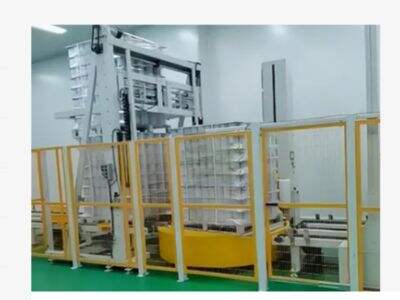India is a huge land filled with diversified population sipping different types of Drinks. The drink business in India has developed a considerable amount over the most recent couple of years on account of such countless individuals. However, the growth has resulted in some fresh dilemmas for those crafting these beverages. Baoli is here to help.

These are exactly the problems, where machines can best help. Machines are used to simplify, hasten and make the manufacture process of drink cans more convenient. These machines work quickly and efficiently, this allows you to save time which requires money. Factories would also then be able to produce more cans at any given time, reducing waste and fulfilling the needs of customers!
Reduce the Slush How Machines are Disrupting India's Bev Industry medium
In India, a few large beverage factories are now using special machines that Palletizers, Depalletizer, and even Cleaning Equipment. Palletizers are machine-fills that place cans in pallets so they can be sent one spot to another. In contrast, Depalletizers take the cans off pallets to be filled or packed.
TurkeyThese machines have revolutionized the canning process of soft drink industry in India. They have reduced the complexity of closing cans quickly Most importantly, having them in place reduces the workload on employees from all that heavy lifting. These tasks also reduce workers' exposure to unsafe conditions and minimize potential workplace accidents as they are often replaced with machines.
Machine-Made Drink Cans: Not Since the Early Days of Automation have Machines Grown this Much
Machines like AGV Forklift have had a massive impact on the drink cans made in India. In the days of yore, cans being cooked up might still have to wait for days before they were ready. However, in the present day use of machines make it possible to go through this process within a few hours. This is a huge step forward as more and smoother cans are needed for drooping beverages.
This also helps in the protection of workers. Simply because there is less need to do nasty jobs that are too risky, the accident rate tend be much lower. Furthermore, the quality of producing cans is enhanced as machines are used to produce them. This means producing a better product that indeed does meet customers expectations because machines make fewer mistakes than humans can.
Drink Can Operations Enhanced With Faster Machine Work
Using machines like Palletizer have significantly accelerated the production for drink cans. The Palletizers and Depalletizer function hand in hand to increase the speed with which cans can be stacked. Cans are now easier to produce and factories do not need as many workers doing simple jobs.
As robots pick up more of the slack, so too can a drink-making factory (source) meet consumer demand. This allows them to produce more cans with less downtime therefore efficiency and sales capacity is critical. On the other hand, it also benefits factories because having machines who mass manufacture cans are done so created perfectly and efficiently to a higher quality (especially if less human error or mistakes occur), not only for the factories but customers too.
Benefits of Palletizers and Depalletizers in A Few Indian Beverages-Hindi
Palletizers and Depalletizer has made a big difference in the drink-making process of India. It has completely expedited - and made safer for all parties involved-the entire process.
Palletizers are used to stack cans quickly and effectively. This is associated with fewer worker hours, which in turn reduces the chances of workplace accidents. Reduce Labour costs, Increases production with lower prices Of the Goods being produced in factories. Not only with factories, but also for its drinkers are well this is going to give a beneficial approach.
Depalletizers are also an essential part of the production flow. They removed all the cans faster, made everything much more efficient. It is essential if factories are to manufacture higher numbers of cans over less time. Similar to Palletizers, Depalletizers reduce labour costs and therefore make the manufacturing process more cost-efficient.

 EN
EN AR
AR
 HR
HR
 DA
DA
 NL
NL
 FI
FI
 FR
FR
 DE
DE
 EL
EL
 HI
HI
 IT
IT
 JA
JA
 KO
KO
 NO
NO
 PL
PL
 PT
PT
 RO
RO
 RU
RU
 ES
ES
 SV
SV
 TL
TL
 IW
IW
 ID
ID
 LT
LT
 SR
SR
 VI
VI
 SQ
SQ
 HU
HU
 TH
TH
 TR
TR
 AF
AF
 MS
MS
 GA
GA
 BN
BN
 HA
HA
 IG
IG
 MR
MR
 NE
NE
 YO
YO
 MY
MY